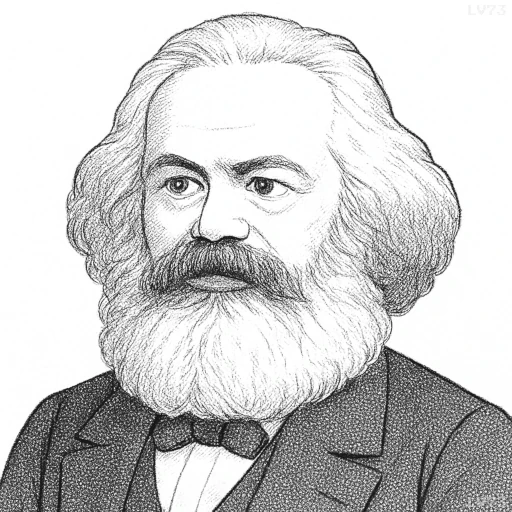“The history of all previous societies has been the history of class struggles.”

- May 5, 1818 – March 14, 1883
- Born in the Kingdom of Prussia (Germany)
- Philosopher, economist, political thinker
table of contents
Quote
“The history of all previous societies has been the history of class struggles.”
Explanation
In this quote, Marx argues that class struggle is the driving force behind all of human history. According to Marx, every society throughout history has been characterized by conflict between different social classes, each with their own interests, power, and resources. These struggles arise because the dominant class in society (the ruling class) holds economic and political power, while the subordinate class (the working or oppressed class) has to sell their labor and face exploitation. The class struggle can be seen in the tension between groups such as slave owners and slaves, feudal lords and serfs, or capitalists and workers in capitalist societies. In each case, the ruling class seeks to maintain their power and privileges, while the oppressed class struggles for better conditions, rights, and ultimately, a change in the social system.
Historically, Marx’s theory is rooted in the analysis of capitalist societies, where the bourgeoisie (capitalist class) controls the means of production, and the proletariat (working class) is forced to sell their labor. Marx believed that the capitalist system was fundamentally exploitative, as the working class creates all wealth through their labor, yet the capitalists appropriate much of that value as profit. Marx also saw the rise of industrial capitalism as an intensification of class struggles, with workers in factories facing alienation and exploitation, while capitalists reaped the benefits of their labor. Marx predicted that this tension would ultimately lead to the overthrow of the capitalist system and the establishment of a socialist society, where the working class would hold power.
In modern terms, Marx’s theory of class struggle remains highly relevant in analyzing ongoing social inequality, economic disparities, and labor movements. The growing wealth gap between the 1% and the rest of the population, especially in neoliberal economies, reflects the ongoing dynamics of class conflict. Movements for economic justice, workers’ rights, universal healthcare, and living wages are part of a long tradition of class struggle, as the working class continues to challenge the inequalities perpetuated by capitalist systems. Marx’s analysis encourages us to recognize that economic inequality is not just a consequence of individual actions but is deeply embedded in the structural relations between the ruling and working classes. Understanding this history of class struggles helps explain the root causes of many contemporary social, political, and economic issues.
Would you like to share your impressions or related stories about this quote in the comments section?
